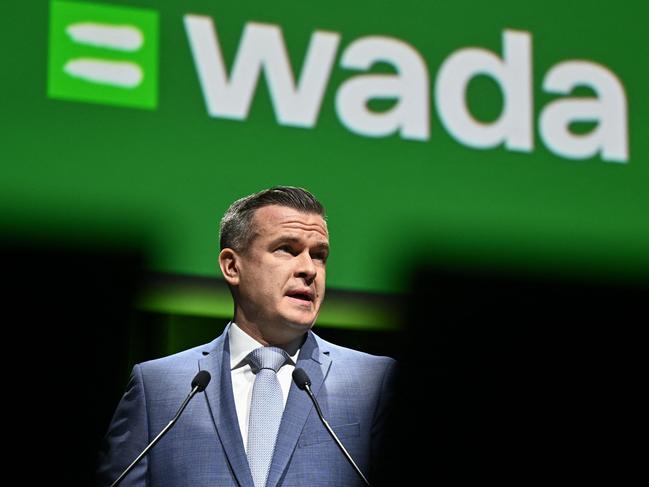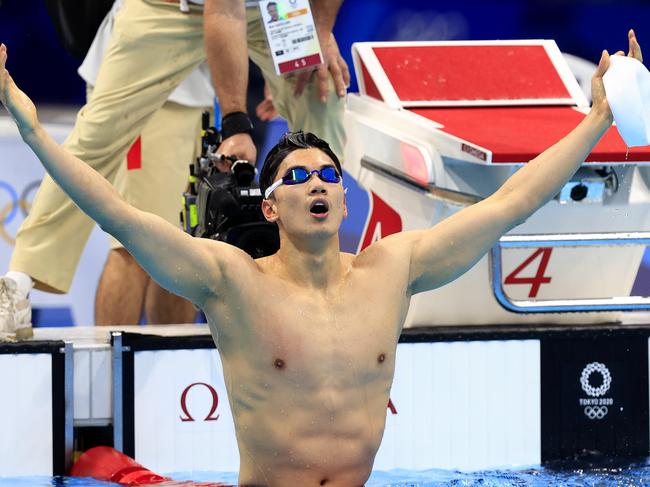WADA refuse to back down over Chinese doping scandal at Tokyo Olympics
The World Anti-Doping Agency is standing by its call not to challenge the decision to clear 23 Chinese swimmers who tested positive, slamming suggestions it has given the nation preferential treatment.
Olympics
Don't miss out on the headlines from Olympics. Followed categories will be added to My News.
The World Anti-Doping Agency (WADA) has slammed suggestions it had gone ‘soft’ on China after choosing not to challenge the decision to acquit the nearly two dozen top swimmers who tested positive in the lead up to the Tokyo Olympics.
Fronting a global media call to address the doping scandal that has rocked the sporting world, WADA’s chiefs rejected the notion they had bowed to political pressure by accepting China’s explanation that its 23 swimmers who failed drugs tests were contaminated.
“We’ve seen some critical comments that are clearly politically motivated. The fact is, we apply the same standards and procedures, regardless of the nationality of the athletes,” WADA President Witold Banka said.
“For those who think we might be soft on Chinese athletes it is worth pointing out that at about the same time our experts were reviewing this case in 2021, we were also at the CAS (Court of Arbitration for Sport) vigorously pursuing justice in the case of another swimmer from China, Sun Yang, so we will continue to protect this sport without fear or favour.”

The first Chinese man to win an Olympic gold medal in swimming, Sun was banned for more than four years after he was found guilty of tampering with samples before they could be tested for performance-enhancing drugs.
He had previously served a three-month ban after testing positive for trimetazidine, or TMZ, the same drug that each of the 23 Chinese swimmers tested positive for in 2021.
First reported by this masthead, the details have only just come to light in the past week, prompting claims from rival countries that the Chinese get treated more leniently than clothes, a notion that WADA strictly disputes.
Banka said the anti-doping watchdog reviewed the files after being notified that the Chinese investigators had found that the results were caused by a contamination so the swimmers were not to blame, and came to the same conclusion.

“At every stage WADA followed all due process and diligently investigated every lead and line of inquiry in this matter,” Witold said.
“If we had to do it over again now, we would do exactly the same thing.
“We carefully reviewed the decision of the Chinese anti-doping organisation from every perspective, we interrogated every piece of “Based on the current evidence… we are talking about a case of environmental contamination that involves innocent athletes and not a doping case involving cheaters.”
WADA provided a long and detailed explanation about its legal and scientific reasons for not pursuing the case but was grilled by reporters about why it accepted the findings of investigators from China, a country with a chequered history of doped athletes.
But WADA’s top lawyer Ross Wenzel said China’s past record was not a factor, because investigators claimed to have found traces of TMZ in the hotel kitchen, albeit two and a half months after the swimmers had left the hotel they were staying in when the positive tests were recorded.

“Do we trust the Chinese authorities that did this? For me, I operate on evidence and that’s what the CAS would have to operate on as well in assessing whether or not the explanation should be accepted,” Wenzel said.
“Certainly, the CAS would not draw any sort of adverse inference or assume skulduggery simply because you’re dealing with Chinese authority.
“In my opinion, given all of the circumstances of this case, if we have gone to CAS to try and contest the contamination scenario we would have close to 0 per cent chance of success.”
Wenzel also pushed back at questions about whether there were double standards at play after the 23 Chinese swimmers were all given the benefit of the doubt while competitors from other countries have been hit hard.
The teenage Russian figure skater Kamila Valieva received a four year ban after testing positive to TMZ before the 2022 Beijing Winter Olympics while US swimmer Madisyn Cox got six months even though she proved it was accidental by tracing the drug back to a batch of contaminated vitamins.
Australia’s Shayna Jack served a two-year-ban, which WADA appealed to double it to four, after testing positive to ligandrol, even though the court agreed she had not ingested the substance knowingly.
“All I can really say is that each case turns on its specific facts, in particular of an analysis of fault and intent,” Wenzel said.
More Coverage
Originally published as WADA refuse to back down over Chinese doping scandal at Tokyo Olympics





